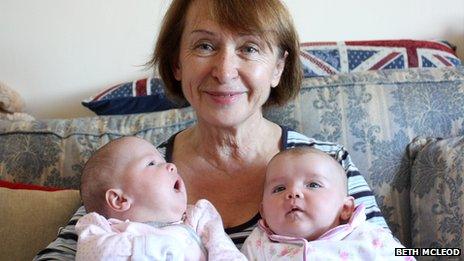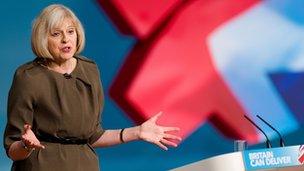How UK immigration laws are splitting families apart
- Published

Nadya with the grandchildren she will soon not be allowed to stay with
The government's promise to reduce net migration by 2015 includes measures that have made it more difficult for people from outside Europe to join family members in the UK, creating tough choices for some British residents.
It's difficult to tell two-month-old twins Tanya and Lara apart. When their father, John, introduces them his mother-in-law Nadya bursts out laughing.
"He's mixed them up again!"
Nadya, 64, is visiting from Russia. Widowed two years ago she recently retired from her job as a doctor and has been helping to look after her tiny granddaughters in Edinburgh.
"Everybody I care about is here, in the UK," she says.
But in January her visitor visa will expire and she will have to return to Russia with no guarantee that she will be allowed back.
John and his wife Yana, both British citizens, had hoped that Nadya would be able to live with them but under the government's new immigration rules, introduced in July, that will no longer be possible.
To be granted indefinite leave to remain, dependent relatives must now prove they need long-term personal care to perform everyday tasks like dressing and feeding themselves.
Even if Nadya met those criteria, Yana and John would need to demonstrate that they could not afford nursing care for her in Russia, while showing they have enough money to provide maintenance and accommodation for her in the UK.
"It's a Catch 22 situation," says John.
"It's particularly cruel," says Yana, "that my mother isn't allowed to be with us unless she's too ill to enjoy it."
The home secretary, Theresa May, told Parliament in June that it has been "too easy for elderly dependent relatives to join their migrant children here and then potentially become a burden on the taxpayer."
But John takes issue with this.
"We as sponsors would sign a document guaranteeing that Nadya would not take benefits for at least five years. I know public money is short, but we are happy to pay for private healthcare and she has savings of her own.
"There's no opportunity to prove this - the government has just pulled the shutters down."
Yana and John are reluctant to relocate the family to Russia because of the unstable political situation there. Yana says she feels betrayed by her adopted country.
"We have to choose between abandoning my mother on her own in Russia or leaving this country if we all want to be together. This system does not take account of family ties."
Dr Avinash Kanodia has to make the same difficult choice.
Recruited by the Department of Health from India in 2003 because of doctor shortages in the NHS, he works as a consultant radiologist in Perth. He, his wife and two children are now British citizens.
An only child, he checked before committing to move to the UK that his mother would be allowed to join them if her health deteriorated.
Under the new rules she would not be granted a visa because Dr Kanodia can afford to pay for nursing care in India.
"The rules are morally wrong. I don't want to leave my mother in the care of a stranger thousands of miles away. I was lured here with the promise of citizenship.
"But look how I am being treated as a citizen of this country. This is the worst thing the government could have done to me."

Home secretary Theresa May announced a "significant fall" in net migration at Conference
Dr Kanodia is now considering whether to move his family back to India before his daughter starts secondary school in 2013.
"I pay over £40,000 in income tax every year. I don't see how driving people like me away will help the economy of this country."
According to the Home Office, 2700 adult dependent relatives were granted visas in 2010. Of those, 1350 were aged 65 or over.
Nicholas Rollason, head of immigration at the London law firm Kingsley and Napley, says the new rules will reduce these numbers dramatically.
"The criteria are now so draconian that I think only a handful of adult dependent relatives - maybe 10 to 20 a year - will get visas. It was never a big problem in terms of numbers or abuse of the system.
"The government seems to be using a hammer to crack a nut."
The new immigration rules do not apply to European nationals living in the UK. Under an EU directive of 2004 - relating to freedom of movement - they can bring dependent relatives - including those from outside Europe - to settle in the UK without any restrictions.
Yana says this makes her feel discriminated against for being British.
"We are friends with a Chinese woman who is married to an Irish man. Because he is an EU national they can sponsor members of her family to come from China and settle in the UK without any problem.
"They have more rights than us, although we are British. People don't believe me when I tell them this, because it seems so unfair - but it's true."
The Immigration Minister Mark Harper declined to be interviewed on this subject, but provided a statement:
"We welcome those who wish to make a life in the UK with their family, work hard and make a contribution but family life must not be established here at the taxpayer's expense.
"To play a full part in British life, family migrants must be able to integrate - that means they must speak our language and pay their way. This is fair to applicants, but also fair to the public."
- Published15 October 2012
- Published11 June 2012
- Published14 April 2011